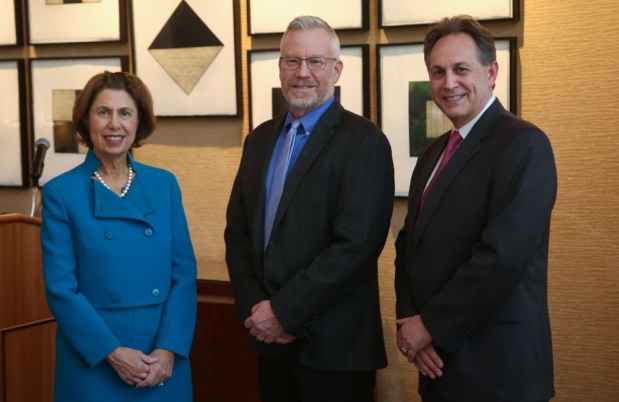Following the profoundly disturbing and tragic events of 2020 that cast a spotlight on racial injustice and inequities in our society, McLean President and Psychiatrist in Chief Scott L. Rauch, MD, felt compelled to take action, and propelled McLean into a dialogue about systemic racism.
“This past year, we saw national events that starkly illustrated the racism and violence that sadly persist throughout our nation and beyond. Also, the racial health inequities were further magnified as we saw the disparities in COVID-19 mortality rates,” said Rauch.
“In reflecting on how we, as an organization, could begin to address racial injustice and inequity within our walls, in Greater Boston, and across the nation, it was clear that we needed to take immediate action.”
Among his first actions was to name Stephanie Pinder-Amaker, PhD, as McLean’s first chief diversity, equity, and inclusion officer (CDEIO). Before being named CDEIO, Pinder-Amaker was a member of the Anti-Racist, Justice, and Health Equity Task Force, charged with the development, implementation, evaluation, and advancement of the hospital’s anti-racist, justice, and health equity strategic plan.
Pinder-Amaker, who founded and directs McLean’s College Mental Health Program, has a long-standing interest in supporting the expansion of the diversity and inclusion programs of McLean and Mass General Brigham. In the fall of 2020, Pinder-Amaker contributed to the National Academies’ report Mental Health, Substance Use, and Wellbeing in Higher Education.
“As part of her new role, Stephanie is already lending her expertise to the national dialogue, resulting in a significant impact on other organizations—particularly those focused on supporting marginalized communities,” said Rauch. “Here at McLean, she is guiding diversity, equity, and inclusion groups and communications strategy as well as the recruitment and hiring of a diverse workforce.”

Dr. Stephanie Pinder-Amaker
One of Pinder-Amaker’s first initiatives was the development of a listening tour to help hospital leadership better understand the systemic racism and inequities experienced by Black, Indigenous, and people of color (BIPOC) employees within the McLean community.
“We are learning so much about our organization and ourselves from the courageous staff who have participated in all aspects of the listening tour,” said Pinder-Amaker. “The findings, which we look forward to sharing broadly, are already re-prioritizing the action steps of our strategic plan. We are preparing to offer the Leading Through Empowered Listening training to more McLean managers in the coming months.”
In preparation for the listening tour, Pinder-Amaker, along with colleagues Caitlin M. Nevins, PhD, and Lauren Wadsworth, PhD, hosted Leading Through Empowered Listening, a two-part training session for approximately 30 members of McLean’s leadership team that was focused on providing attendees with the skills needed to hear and validate experiences of bias, marginalization, and racism brought forward by members of the McLean community.
“I envision a McLean in which employees across all of our mission elements—clinical, research, and training, wherever they sit within our organization—see themselves within these efforts and have a growing understanding of what their contributions can be.”
– Stephanie Pinder-Amaker
“There is tremendous interest and commitment on the part of McLean’s administrative and clinical leaders to identify and address individual and systemic instances of racism at McLean,” said Brent P. Forester, MD, MSc, chief of the Division of Geriatric Psychiatry and one of the leadership volunteers who participated in the listening tour. “Thanks to these initial efforts by Stephanie and her team, those of us who are actively engaged in these conversations with our BIPOC colleagues are better listeners and allies.”
In addition to the listening tour, Pinder-Amaker and the Anti-Racist, Justice, and Health Equity Committee, which is composed of faculty and staff from across all areas of the hospital, have developed a curated list of anti-racist and racial justice educational resources that are used by hospital employees for self-education and support and to begin conversations with peers and within teams throughout McLean.
“My overarching vision for advancing diversity, equity, and inclusion at McLean is really straightforward,” said Pinder-Amaker. “I envision a McLean in which employees across all of our mission elements—clinical, research, and training, wherever they sit within our organization—see themselves within these efforts and have a growing understanding of what their contributions can be.”
Media Requests
Journalist or member of the media? We are available 24/7 for media requests.



